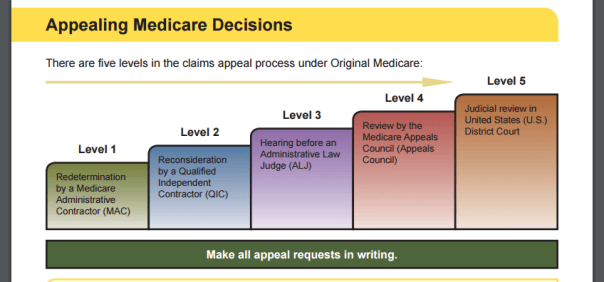Blog Archives
Medicare Appeal Backlog: Tough Tooties!…Unless…[Think Outside the Box!]
When you are accused of a $12 million dollar overpayment by Medicare, obviously, you appeal it.But do you expect that appeal to take ten years or longer? Are such long, wait periods allowed by law? That is what Cumberland Community Hospital System, Inc. (Cape Fear) discovered in a 4th Circuit Court of Appeals Decision, on March 7, 2016, denying a Writ of Mandamus from the Court and refusing to order the Secretary of Health and Human Services (HHS) Burwell to immediately adjudicate Cape Fear’s Medicare appeals to be heard within the Congressional requirement that appeals be heard and decided by Administrative Law Judges (ALJs) within 90 days.
According to the Center for Medicare and Medicaid Services‘ (CMS) website, an “ALJ will generally issue a decision within 90 days of receipt of the hearing request. Again, according to CMS’ website, this time frame may be extended for a variety of reasons including, but not limited to:
- The case being escalated from the reconsideration level
- The submission of additional evidence not included with the hearing request
- The request for an in-person hearing
- The appellant’s failure to send a notice of the hearing request to other parties
- The initiation of discovery if CMS is a party.”
In Cape Fear’s case, the Secretary admitted that the Medicare appeal backlog equates to more than 800,000 claims and would, likely, take over 10 years to adjudicate all the claims. Even the 4th Circuit Court, which, ultimately, dismissed Cape Fear’s complaint, agrees with Cape Fear and calls the Medicare appeal backlog “incontrovertibly grotesque.”
Generally, the rule is that if the ALJ does not render a decision after 180 days of the filing of the case, then the provider has the right to escalate the case to the Medicare Appeals Council, which is the 4th step of a Medicare appeal. See blog for more details on the appeal process.

What about after 3,650 days? Get a big pie in the face?
The United States Code is even less vague than CMS’ website. Without question 42 U.S.C. states that for a:
“(1)Hearing by administrative law judge; (A)In general
Except as provided in subparagraph (B), an administrative law judge shall conduct and conclude a hearing on a decision of a qualified independent contractor under subsection (c) of this section and render a decision on such hearing by not later than the end of the 90-day period beginning on the date a request for hearing has been timely filed.”
(emphasis added). And, BTW, subsection (B) is irrelevant here. It contemplates when a party moves for or stipulates to an extension past the 90-day period.
So why did Cape Fear lose? How could the hospital lose when federal administrative code specifically spells out mandatory 90-day limit for a decision by an ALJ? Ever heard of a statute with no teeth? [i.e., HIPAA].
No one will be surprised to read that I have my opinions. First, a writ of mandamus was not the legal weapon to wield. It is an antiquated legal theory that rarely makes itself useful in modern law. I remember the one and only time I filed a writ of mandamus in state court in an attempt to hold a State Agency liable for willfully violating a Court’s Order. I appeared before the judge, who asked me, “Do you know how long I have been on this bench?” To which I responded, “Yes, Your Honor, you have been on the bench for X number of years.” He said, “Do you know how many times I have granted a writ of mandamus?” I said, “No, Your Honor.” “Zero,” he said, “Zero.” The point is that writs of mandamus are rare. A party must prove to the court that he/she has a clear and indisputable right to what is being asked of the court.
Secondly, in my mind, Cape Fear made a disastrous mistake in arguing that it has a clear right for its Medicare appeals to be adjudicated immediately. Think about it…there are 800,000+ Medicare appeals pending before the ALJs. What judge would ever order the administrative court to immediately drop all other 799,250 pended claims (Cape Fear had 750 claims pending) and to adjudicate only Cape Fear’s claims? It is the classic slippery slope…if you do this for Cape Fear, then you need to order the same for the rest of the pended claims.
In this instance, it appears that Cape Fear requested too drastic a measure for a federal judge to order. The claims were doomed from the beginning.
However, I cannot fault Cape Fear for trying since the code is crystal clear in requiring a 90-day turnaround time. The question becomes…what is the proper remedy for a gross disregard, even if unwillful, of the 90-day turnaround period?
This would have taken thinking outside the box.
Medicare providers have some rights. I discuss those rights frequently on this blog. But the population that the courts inevitably want to insulate from “David and Goliath situations” are the recipients. Unlike the perceived, “big, strong, and well-attorneyed” hospital, recipients often find themselves lacking legal representation to defend their statutorily-given right to choose their provider and exercise their right to access to care.
Had Cape Fear approached the same problem from a different perspective and argued violations of law on behalf of the beneficiaries of Cape Fear’s quality health care services, a different result may have occurred.
Another way Cape Fear could have approached the same problem, could have been a request for the Court to Cape Fear’s funds owed for service rendered to be released pending the litigation.
As always, there is more than one way to skin a cat. I humbly suggest that when you have such an important case to bring…BRING IT ALL!!


